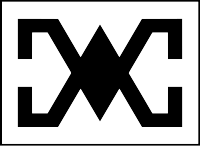
Back الأرض والحرية Arabic Frente Nacionalista Patria y Libertad Spanish Patria y Libertad Estonian Patria y Libertad French Patria y Libertad ID Fronte Nazionalista Patria e Libertà Italian 국민주의자전선 조국과 자유 Korean Front Narodowy Ojczyzna i Wolność Polish Patria y Libertad Portuguese Родина и свобода Russian
Fatherland and Liberty Patria y Libertad | |
|---|---|
 Logo of the group. The "Spider" of the Nationalist Front Fatherland and Liberty. According to Manuel Fuentes Wendling the symbol was created with the aim of being associated with the Nazi swastika.[1] | |
| Leader | Pablo Rodríguez Grez |
| Founded | 1971 |
| Dissolved | 12 September 1973 |
| Succeeded by | National Advance (unofficial)[2] |
| Ideology | Ultranationalism Corporatism Anti-communism Radical right[3] Neo-fascism[A] Anti-parliamentarism[4] Anti-liberalism[3] |
| Political position | Far-right |
| Colors | Black & white |
The Fatherland and Liberty Nationalist Front (Spanish: Frente Nacionalista Patria y Libertad or simply Patria y Libertad, PyL) was a Chilean fascist,[5] political and paramilitary group[6] that fought against the democratically elected Popular Unity government of Salvador Allende, in Chile.
The group was formed by Pablo Rodríguez Grez in 1970 with Roberto Thieme as secretary general, and turned more and more clandestine throughout the presidency of Salvador Allende.
In June 1973, the group attempted to carry out a coup against the Allende government but failed, in an event known as the Tanquetazo. In July 1973, it received orders from the Chilean Navy, which opposed the Schneider Doctrine of military adherence to the constitution, to sabotage Chile's infrastructure. The collaboration between Fatherland and Liberty and the Chilean Armed Forces increased after the failed October 1972 strike which had sought to overthrow Allende socialist administration. In agreement with the sectors opposing Allende in the military, the group assassinated on 26 July 1973 Allende's naval aide, Arturo Araya Peeters.[7] The first sabotage was committed this same day. Others include creating a power outage while Allende was being broadcast.[8]
It was officially disbanded on 12 September 1973, following Pinochet's coup. Many members of PyL were then recruited by Chilean security services and participated in the persecution of those opposed to Pinochet's junta. Still others like Roberto Thieme became convinced opponents of the regime (Thieme in particular opposed the neo-liberal economic policies under Pinochet). Since the transition to democracy, some small groups have since claimed to be its successor, but are not officially linked to the original PyL.
- ^ Reportajes 24: Patria y Libertad, los pasos de la "Araña" (min 7:08) – via Youtube. Accessed 16 March 2020.
- ^ Saez, Manuel Alcantara; Sáez, Manuel Alcántara; Freidenberg, Flavia (eds ) & (1 de enero de 2001). Partidos políticos de América Latina. Cono Sur. Universidad de Salamanca. p. 351.
- ^ a b Boisard, Stéphane (2016). "La matriz antiliberal en las derechas radicales: el caso del Frente Nacional Patria y Libertad en Chile (1971-1973)". Nuevo Mundo Mundos Nuevos. doi:10.4000/nuevomundo.69124.
- ^ Boisard, Stéphane (13 June 2017). "El antiparlamentarismo visceral y la solución del corporativismo militar". Nuevo Mundo Mundos Nuevos. Nouveaux Mondes Mondes Nouveaux - Novo Mundo Mundos Novos - New World New Worlds. doi:10.4000/nuevomundo.69124.
- ^ Academic literature describing FNPL as a fascist movement:
- "Pablo Rodriguez, a lawyer and gremialista, formed the Movimiento Nacionalista 'Patria y Libertad' (Fatherland and Freedom), a paramilitary fascist organization, after Allende came to power." In: De los Angeles Crummett, M. (1977). "El Poder Feminino: The Mobilization of Women against Socialism in Chile". Latin American Perspectives, 4(4), p. 106.
- "... the UN report said that it had recruited tens of thousands of collaborators, many from the fascist Patria y Libertad group." In: Webber, F. (1999). "The Pinochet case: the struggle for the realization of human rights". Journal of Law and Society, 26(4), p. 527.
- "the fascist street-fighters of Patria y Libertad who filled the streets with garbage and gunned down antifascist truck drivers racing down the streets bringin" In: Petras, J., & Petras, B. (1973). "The Chilean coup". Instant Research on Peace and Violence, 3(4), p. 163.
- "... hundreds of rightst anti-government terrorist incidents, particularly by the fascist Patria y Libertad ..." (ibid., p. 166)
- "With all of these thoughts filling his head, Frei joined efforts with Jarpa of the National Party and Thieme of the Patria y Libertad fascists in their efforts to sabotage the economy and undermine the Allende Government in the firm belief that a military take-over would be temporary – a transitory phenomena - leading to the reestablishment of a Christian Democratic Government." (ibid., p. 173)
- "The only available groups willing and acceptable to the junta were the ultra-right National Party, the fascist Patria y Libertad and the business and professional associations." (ibid. p. 176)
- ^ Blum, William. Killing Hope: U. S. Military and CIA Interventions Since World War II - Part I, London: Zed Books, 2003, p. 213. ISBN 1-84277-369-0
- ^ "¿Quién mató al comandante Araya?" Archived 27 September 2007 at the Wayback Machine, La Nación, 20 March 2005 (in Spanish)
- ^ "Confesiones de un ex Patria y Libertad" Archived 27 September 2007 at the Wayback Machine, TVN, 12 February 2006 (in Spanish)
Cite error: There are <ref group=upper-alpha> tags or {{efn-ua}} templates on this page, but the references will not show without a {{reflist|group=upper-alpha}} template or {{notelist-ua}} template (see the help page).